because的用法归纳_用法辨析 英语语法.doc
考研英语语法考点详解 连词辨析(because,since,as和for)
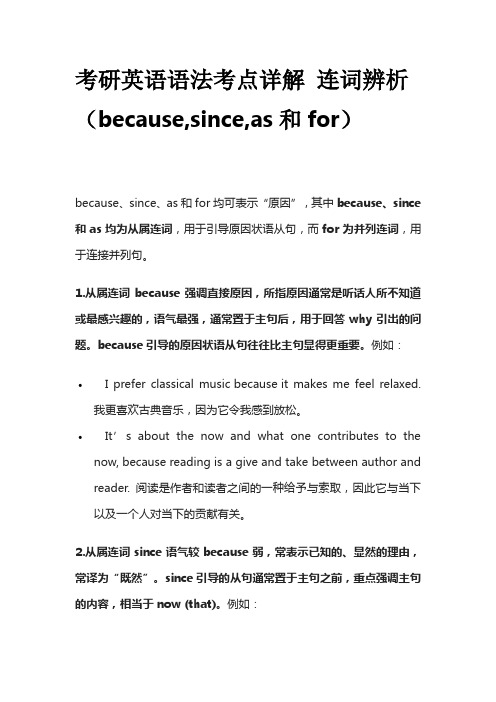
考研英语语法考点详解连词辨析(because,since,as和for)because、since、as和for均可表示“原因”,其中because、since 和as均为从属连词,用于引导原因状语从句,而for为并列连词,用于连接并列句。
1.从属连词because强调直接原因,所指原因通常是听话人所不知道或最感兴趣的,语气最强,通常置于主句后,用于回答why引出的问题。
because引导的原因状语从句往往比主句显得更重要。
例如:•I prefer classical music because it makes me feel relaxed.我更喜欢古典音乐,因为它令我感到放松。
•It’s about the now and what one contributes to the now, because reading is a give and take between author and reader. 阅读是作者和读者之间的一种给予与索取,因此它与当下以及一个人对当下的贡献有关。
2.从属连词since语气较because弱,常表示已知的、显然的理由,常译为“既然”。
since引导的从句通常置于主句之前,重点强调主句的内容,相当于now (that)。
例如:•Since you have repaired my TV set, there is no need for me to buy a new one. 既然你把我的电视机修好了,我就没有必要买新的了。
•We thought that, since we were in the area, we’d stop by and see them. 我们想,既然到了这个地方,就该顺便去看看他们。
3.从属连词as引导原因状语从句时,表示双方已知的事实或显而易见的原因,用法与since大致相同,但语气更弱,没有since正式。
例如:•I don’t enjoy watching TV with my brother as he always switches over to the programs that he wants to watch. 我不喜欢和我弟弟一起看电视,因为他总是切换到他想看的节目。
because表语从句
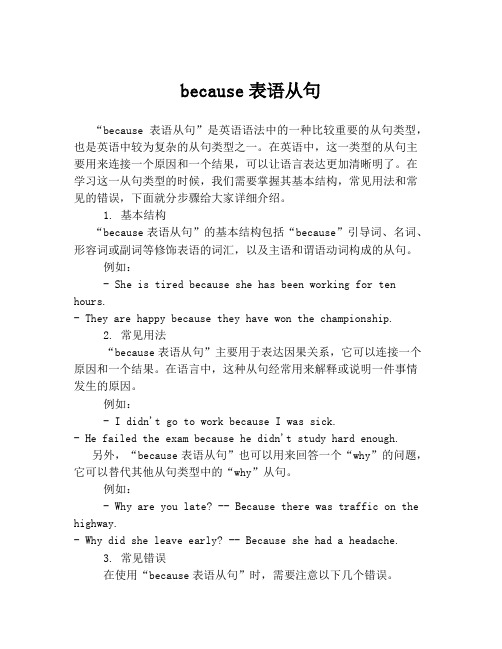
because表语从句“because表语从句”是英语语法中的一种比较重要的从句类型,也是英语中较为复杂的从句类型之一。
在英语中,这一类型的从句主要用来连接一个原因和一个结果,可以让语言表达更加清晰明了。
在学习这一从句类型的时候,我们需要掌握其基本结构,常见用法和常见的错误,下面就分步骤给大家详细介绍。
1. 基本结构“because表语从句”的基本结构包括“because”引导词、名词、形容词或副词等修饰表语的词汇,以及主语和谓语动词构成的从句。
例如:- She is tired because she has been working for ten hours.- They are happy because they have won the championship.2. 常见用法“because表语从句”主要用于表达因果关系,它可以连接一个原因和一个结果。
在语言中,这种从句经常用来解释或说明一件事情发生的原因。
例如:- I didn't go to work because I was sick.- He failed the exam because he didn't study hard enough.另外,“because表语从句”也可以用来回答一个“why”的问题,它可以替代其他从句类型中的“why”从句。
例如:- Why are you late? -- Because there was traffic on the highway.- Why did she leave early? -- Because she had a headache.3. 常见错误在使用“because表语从句”时,需要注意以下几个错误。
- 应避免主语和谓语动词不一致的情况。
例如:“She is happy because they won the game.” 这句话中,主语是“She”,谓语动词是“is”,因此正确的应该是“She is happy because they won the game.”- 应避免在从句中使用“and”或“but”等连词。
英语语法原因状语从句用法说明

英语语法原因状语从句用法说明英语语法原因状语从句用法说明原因状语从句主要的有because, as, since, seeing (that), now (that), considering (that) 等。
如:1. 由because引导He couldn’t get to school because he hada cold. 他因患感冒而未能去上学。
I can’t take the examination because I am ill. 我不能参加考试因为我生病了。
He distrusted me because I was new. 他不信任我是因为我是新来的`。
Because I worked fast, I finished early. 因为我干得快,所以我完成得早。
They can’t have gone out because the light’s on. 他们不可能出去了,因为灯还亮着。
He could not concentrate because the room was noisy. 他不能集中思想,因为房里太吵。
I read no further than the caption because the subject of the article seemed uninteresting. 我只看了标题,因为文章题目似乎不引人兴趣。
I could have gone with you because I was there at that time. 我本来可以和你一道去的,因为那时我也在那里。
2. 由as引导As all the seats full I stood up. 因为所有座位都有人,我就站了起来。
As it’s raining, we’ll have to stay at home. 因为天下雨,我们得待在家里。
As all the seats were full he stood up. 由于所有座位都有人了,他站了起来。
七下英语语法连词填空because等

七下英语语法连词填空because等【原创版】目录1.文章简介2.连词的定义和作用3.because 等连词的用法4.语法连词填空练习5.总结正文【1.文章简介】本篇文章主要介绍英语语法中连词的使用,特别是以 because 为代表的连词在句子中的填空练习,帮助学生更好地掌握英语语法和提高写作能力。
【2.连词的定义和作用】连词(Conjunction)是英语语法中的一种词性,主要用来连接词、短语或句子。
连词可以使句子结构更加严密,逻辑更加清晰,从而更好地表达作者的观点和意图。
常见的连词有 and, but, or, for, nor, yet, so 等。
【3.because 等连词的用法】以 because 为例,它主要用于表示原因,引导原因状语从句。
在英语句子中,因为通常可以和 since, since…以来,as 等连词互换使用。
例如:- Because/Since he is ill, he didn"t go to school.(因为他生病了,所以他没去上学。
)- As he is ill, he didn"t go to school.(因为他生病了,所以他没去上学。
)【4.语法连词填空练习】以下是一些以 because 等连词为主的语法填空练习题,帮助大家巩固所学知识:- I didn"t go to the party last night, _______ I had to study for the exam.(因为我要为考试复习)- She didn"t tell me the truth, _______ she was afraid I would get upset.(因为她怕我会生气)- They arrived late, _______ the traffic was very heavy.(因为交通非常拥堵)【5.总结】通过本篇文章的学习,大家对英语语法中的连词有了更深入的了解,特别是对 because 等表示原因的连词有了更清晰的认识。
使用because的五个注意事项
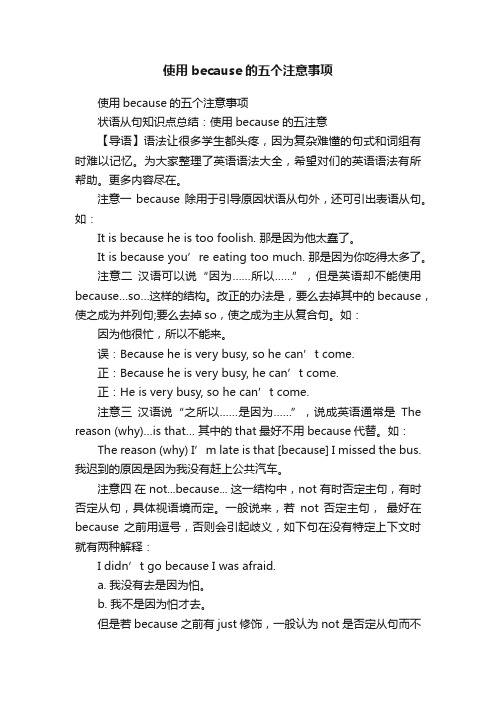
使用because的五个注意事项使用because的五个注意事项状语从句知识点总结:使用because的五注意【导语】语法让很多学生都头疼,因为复杂难懂的句式和词组有时难以记忆。
为大家整理了英语语法大全,希望对们的英语语法有所帮助。
更多内容尽在。
注意一because 除用于引导原因状语从句外,还可引出表语从句。
如:It is because he is too foolish. 那是因为他太蠢了。
It is because you’re eating too much. 那是因为你吃得太多了。
注意二汉语可以说“因为……所以……”,但是英语却不能使用because…so…这样的结构。
改正的办法是,要么去掉其中的because,使之成为并列句;要么去掉so,使之成为主从复合句。
如:因为他很忙,所以不能来。
误:Because he is very busy, so he can’t come.正:Becaus e he is very busy, he can’t come.正:He is very busy, so he can’t come.注意三汉语说“之所以……是因为……”,说成英语通常是The reason (why)…is that… 其中的that最好不用because代替。
如:The reason (why) I’m late is that [because] I missed the bus. 我迟到的原因是因为我没有赶上公共汽车。
注意四在 not...because... 这一结构中,not 有时否定主句,有时否定从句,具体视语境而定。
一般说来,若not 否定主句,最好在because 之前用逗号,否则会引起歧义,如下句在没有特定上下文时就有两种解释:I didn’t go because I was afraid.a. 我没有去是因为怕。
b. 我不是因为怕才去。
但是若 because 之前有 just 修饰,一般认为 not 是否定从句而不是主句。
12月六级语法:because, since, as, for用法区别
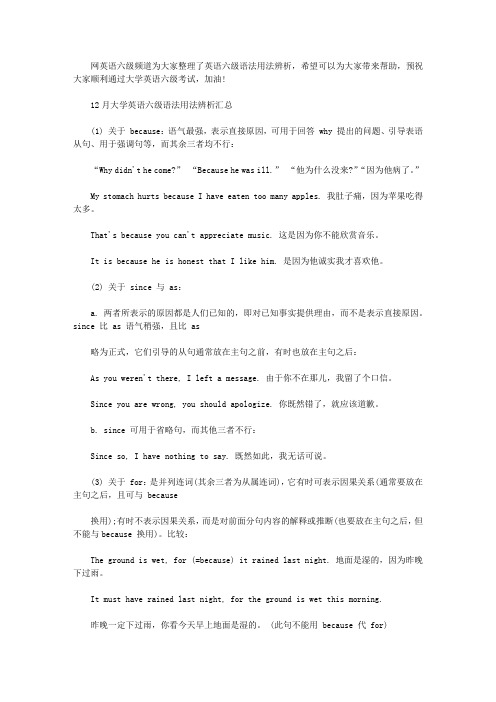
网英语六级频道为大家整理了英语六级语法用法辨析,希望可以为大家带来帮助,预祝大家顺利通过大学英语六级考试,加油!12月大学英语六级语法用法辨析汇总(1) 关于 because:语气最强,表示直接原因,可用于回答 why 提出的问题、引导表语从句、用于强调句等,而其余三者均不行:“Why didn't he come?”“Because he was ill.”“他为什么没来?”“因为他病了。
”My stomach hurts because I have eaten too many apples. 我肚子痛,因为苹果吃得太多。
That's because you can't appreciate music. 这是因为你不能欣赏音乐。
It is because he is honest that I like him. 是因为他诚实我才喜欢他。
(2) 关于 since 与 as:a. 两者所表示的原因都是人们已知的,即对已知事实提供理由,而不是表示直接原因。
since 比 as 语气稍强,且比 as略为正式,它们引导的从句通常放在主句之前,有时也放在主句之后:As you weren't there, I left a message. 由于你不在那儿,我留了个口信。
Since you are wrong, you should apologize. 你既然错了,就应该道歉。
b. since 可用于省略句,而其他三者不行:Since so, I have nothing to say. 既然如此,我无话可说。
(3) 关于 for:是并列连词(其余三者为从属连词),它有时可表示因果关系(通常要放在主句之后,且可与 because换用);有时不表示因果关系,而是对前面分句内容的解释或推断(也要放在主句之后,但不能与because 换用)。
比较:The ground is wet, for (=because) it rained last night. 地面是湿的,因为昨晚下过雨。
冀教版初中二年级英语语法第四讲:when或because 引导的状语从句
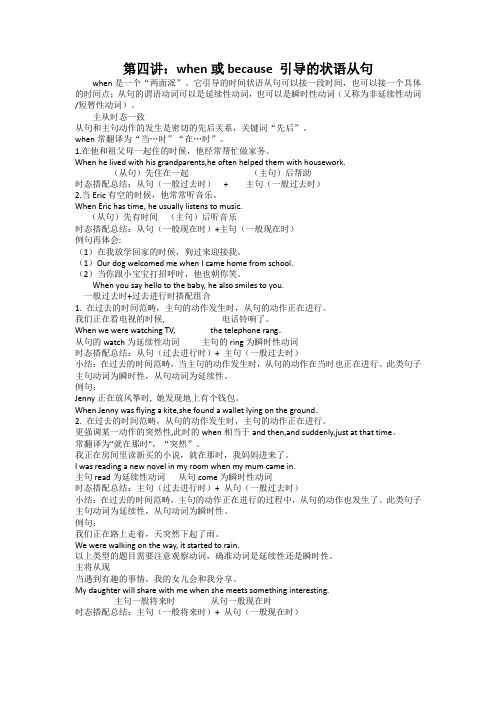
第四讲:when或because 引导的状语从句when是一个“两面派”。
它引导的时间状语从句可以接一段时间,也可以接一个具体的时间点;从句的谓语动词可以是延续性动词,也可以是瞬时性动词(又称为非延续性动词/短暂性动词)。
主从时态一致从句和主句动作的发生是密切的先后关系,关键词“先后”。
when常翻译为“当…时”“在…时”。
1.在他和祖父母一起住的时候,他经常帮忙做家务。
When he lived with his grandparents,he often helped them with housework.(从句)先住在一起(主句)后帮助时态搭配总结:从句(一般过去时)+ 主句(一般过去时)2.当Eric有空的时候,他常常听音乐。
When Eric has time, he usually listens to music.(从句)先有时间(主句)后听音乐时态搭配总结:从句(一般现在时)+主句(一般现在时)例句再体会:(1)在我放学回家的时候,狗过来迎接我。
(1)Our dog welcomed me when I came home from school.(2)当你跟小宝宝打招呼时,他也朝你笑。
When you say hello to the baby, he also smiles to you.一般过去时+过去进行时搭配组合1. 在过去的时间范畴,主句的动作发生时,从句的动作正在进行。
我们正在看电视的时候, 电话铃响了。
When we were watching TV, the telephone rang.从句的watch为延续性动词主句的ring为瞬时性动词时态搭配总结:从句(过去进行时)+ 主句(一般过去时)小结:在过去的时间范畴,当主句的动作发生时,从句的动作在当时也正在进行。
此类句子主句动词为瞬时性,从句动词为延续性。
例句:Jenny正在放风筝时, 她发现地上有个钱包。
because because of用法
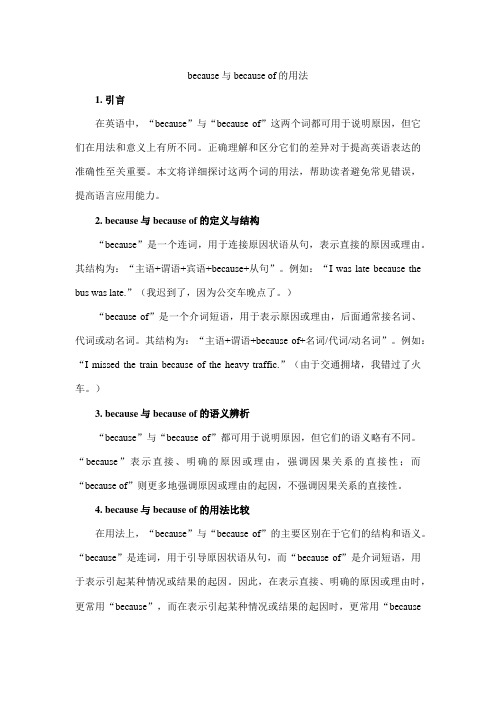
because与because of的用法1. 引言在英语中,“because”与“because of”这两个词都可用于说明原因,但它们在用法和意义上有所不同。
正确理解和区分它们的差异对于提高英语表达的准确性至关重要。
本文将详细探讨这两个词的用法,帮助读者避免常见错误,提高语言应用能力。
2. because与because of的定义与结构“because”是一个连词,用于连接原因状语从句,表示直接的原因或理由。
其结构为:“主语+谓语+宾语+because+从句”。
例如:“I was late because the bus was late.”(我迟到了,因为公交车晚点了。
)“because of”是一个介词短语,用于表示原因或理由,后面通常接名词、代词或动名词。
其结构为:“主语+谓语+because of+名词/代词/动名词”。
例如:“I missed the train because of the heavy traffic.”(由于交通拥堵,我错过了火车。
)3. because与because of的语义辨析“because”与“because of”都可用于说明原因,但它们的语义略有不同。
“because”表示直接、明确的原因或理由,强调因果关系的直接性;而“because of”则更多地强调原因或理由的起因,不强调因果关系的直接性。
4. because与because of的用法比较在用法上,“because”与“because of”的主要区别在于它们的结构和语义。
“because”是连词,用于引导原因状语从句,而“because of”是介词短语,用于表示引起某种情况或结果的起因。
因此,在表示直接、明确的原因或理由时,更常用“because”,而在表示引起某种情况或结果的起因时,更常用“becauseof”。
此外,“because”可以用于回答why引导的疑问句,而“because of”则不能。
because和due to用法(一)

because和due to用法(一)因为(because) 和由于(due to) 是英语中经常使用的两个表达原因的词语。
它们在句子中具有不同的作用和语法用法。
在下面的文章中,我们将详细介绍这两个词语及其用法。
因为(because)因为(because) 是一个连词,用于引导一个原因。
它将一个原因与结果连接在一起,使读者或听者能够理解一个事件发生的原因。
以下是因为(because) 的几个用法:1.句子间使用:因为(because) 可以连接两个完整的句子。
例如:–I couldn’t attend the party because I was sick.(我不能参加派对,因为我生病了。
)–They canceled the flight because of bad weather.(由于天气恶劣,他们取消了航班。
)2.句子内使用:因为(because) 也可以出现在一个句子的中间,连接一个原因和结果。
例如:–I didn’t go to the movie, because I had already seen it.(我没去看电影,因为我已经看过了。
)3.用于回答为什么的问题:当被问及为什么做某事时,因为(because) 可被用来给出原因。
例如:–Why did he leave early? Because he had anappointment.(他为什么早退?因为他有个约会。
)由于(due to)由于(due to) 通常用来指明某件事或者情况造成了特定的结果。
它常常用来修饰一个名词或名词短语,并表示一个原因或原因的结果。
以下是由于(due to) 的几个用法:1.修饰名词或名词短语:由于(due to) 后面跟随一个名词或名词短语,用来描述导致某种情况或结果的原因。
例如:–The delay was due to heavy traffic.(延误是由于交通拥堵。
)–The flight cancellation was due to mechanicalproblems.(航班取消是由于机械故障。
新标准英语六年级下册M9语法—why和because

新标准英语六年级下册M9语法—why和becausewhy和because用法:1、why表示“为什么”,用来询问原因,一般要用because……来回答。
____Why don’t you go to school?____Because it’s Sunday.2、because表示“因为”,用来回答“why”的问句。
____Why are you late?____Because I get up late.特别提醒:because,因为;So,所以。
和汉语“因为……,所以……”不同,在英语中because和so在一个句子中不能同时用,只能用其一。
如:Because I was ill yesterday,I didn’t go to school.= I was ill yesterday,so I didn’t go to school.但Because I was ill yesterday,so I didn’t go to school.是错误的。
Exercises:一、根据实际情况回答问题1.Why couldn’t Helen Keller hear?Because she became deaf as a small child.2.Why couldn’t Helen Keller see?Because she became blind as a small child.3.Why did they wear the baseball cups on their heads?Because Lingling made a mistake with cups and caps.二、根据要求做题1.合并句子:Why are you wearing a raincoat?Because it’s going to rain.I’m wearing a raincoat because it’s going to rain.2. Correct the silly sentences(改正错句):(1)I’m wearing a dress because I’m going to go swimming.(2) I’m wearing a dress because I’m going to play basketball.(3) I’m wearing a coat because it’s going to be hot. (答案见SB)(4)I’m eating noodles because I’m thirsty. (改thirsty(渴的)为hungry)3.合并句子:(1)It’s going to rain. I’m wearing a raincoat.(because)Because it’s going to rain,I’m wearing a raincoat.I’m wearing a raincoat because it’s going to rain. (2)I’m wearing a hat. It’s going to be hot.(so)It’s going to be hot,so I’m wearing a hat.4. I don’t go to school because it’s Sunday.(对画线部分提问)Why don’t you go to school?5.Sam / swimsuit / swimming(用because造句,说明因果关系)Sam is wearing a swimsuit because he is going to go swimming. 三.填空练习用why because and but so first then填空。
because引导名词从句
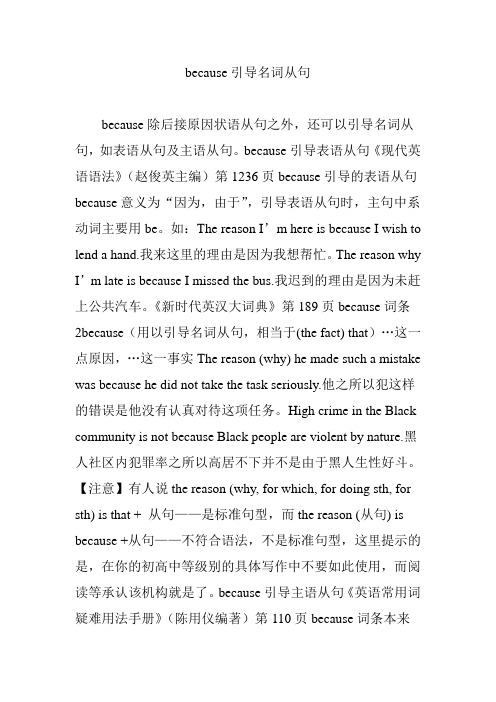
because引导名词从句because除后接原因状语从句之外,还可以引导名词从句,如表语从句及主语从句。
because引导表语从句《现代英语语法》(赵俊英主编)第1236页because引导的表语从句because意义为“因为,由于”,引导表语从句时,主句中系动词主要用be。
如:The reason I’m here is because I wish to lend a hand.我来这里的理由是因为我想帮忙。
The reason why I’m late is because I missed the bus.我迟到的理由是因为未赶上公共汽车。
《新时代英汉大词典》第189页because词条2because(用以引导名词从句,相当于(the fact) that)…这一点原因,…这一事实The reason (why) he made such a mistake was because he did not take the task seriously.他之所以犯这样的错误是他没有认真对待这项任务。
High crime in the Black community is not because Black people are violent by nature.黑人社区内犯罪率之所以高居不下并不是由于黑人生性好斗。
【注意】有人说the reason (why, for which, for doing sth, for sth) is that + 从句——是标准句型,而the reason (从句) is because +从句——不符合语法,不是标准句型,这里提示的是,在你的初高中等级别的具体写作中不要如此使用,而阅读等承认该机构就是了。
because引导主语从句《英语常用词疑难用法手册》(陈用仪编著)第110页because词条本来because引入的从句都是原因状语从句,但是美国非正式英语中,because从句在一个情况下可以作为名词从句,并且升格为整句的主语,那就是Just because…doesn’t…Just because he thinks it a good idea doesn’t mean it’s a good idea.他觉得是好办法,不见得就是好办法。
英语 because引导的原因状语从句
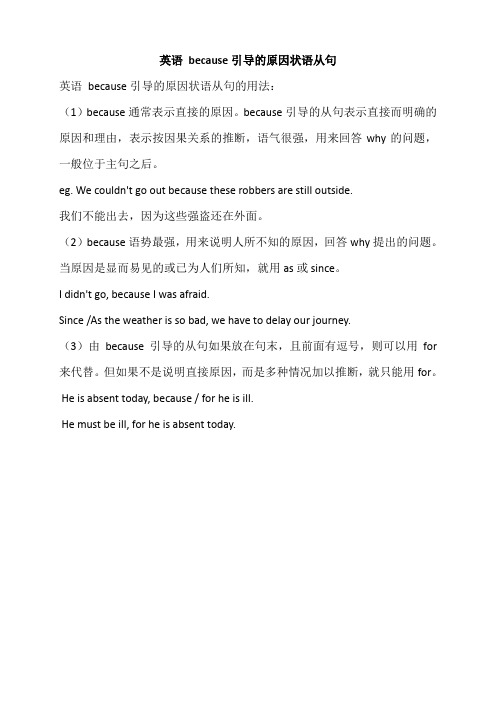
英语because引导的原因状语从句
英语because引导的原因状语从句的用法:
(1)because通常表示直接的原因。
because引导的从句表示直接而明确的原因和理由,表示按因果关系的推断,语气很强,用来回答why的问题,一般位于主句之后。
eg. We couldn't go out because these robbers are still outside.
我们不能出去,因为这些强盗还在外面。
(2)because语势最强,用来说明人所不知的原因,回答why提出的问题。
当原因是显而易见的或已为人们所知,就用as或 since。
I didn't go, because I was afraid.
Since /As the weather is so bad, we have to delay our journey.
(3)由because引导的从句如果放在句末,且前面有逗号,则可以用for 来代替。
但如果不是说明直接原因,而是多种情况加以推断,就只能用for。
He is absent today, because / for he is ill.
He must be ill, for he is absent today.。
英语语法知识点详解Because of
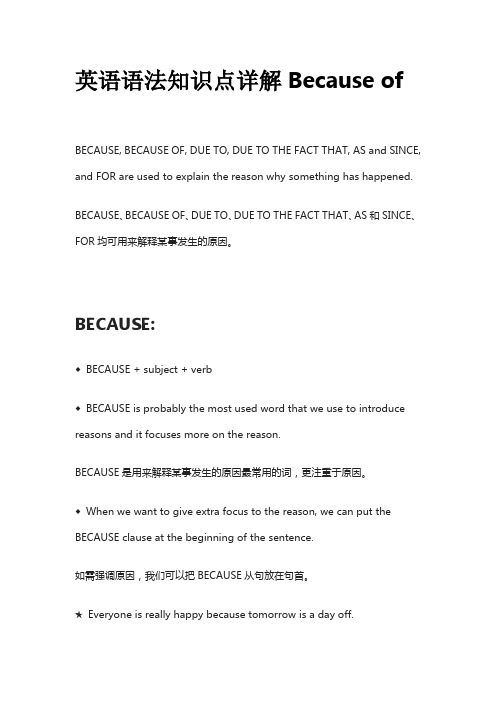
英语语法知识点详解Because ofBECAUSE, BECAUSE OF, DUE TO, DUE TO THE FACT THAT, AS and SINCE, and FOR are used to explain the reason why something has happened. BECAUSE、BECAUSE OF、DUE TO、DUE TO THE FACT THAT、AS和SINCE、FOR均可用来解释某事发生的原因。
BECAUSE:◆BECAUSE + subject + verb◆BECAUSE is probably the most used word that we use to introduce reasons and it focuses more on the reason.BECAUSE是用来解释某事发生的原因最常用的词,更注重于原因。
◆When we want to give extra focus to the reason, we can put the BECAUSE clause at the beginning of the sentence.如需强调原因,我们可以把BECAUSE从句放在句首。
★Everyone is really happy because tomorrow is a day off.★每个人都很开心,因为明天放假。
★Many tourists visit France because the scenery is beautiful.★许多游客去法国,因为那里的风景很美。
★I stayed at home because it was raining out.★我呆在家里,因为外面在下雨。
★We cancelled the class because not enough students enrolled.★我们取消了这门课,因为报名的学生不多。
because引导表语从句
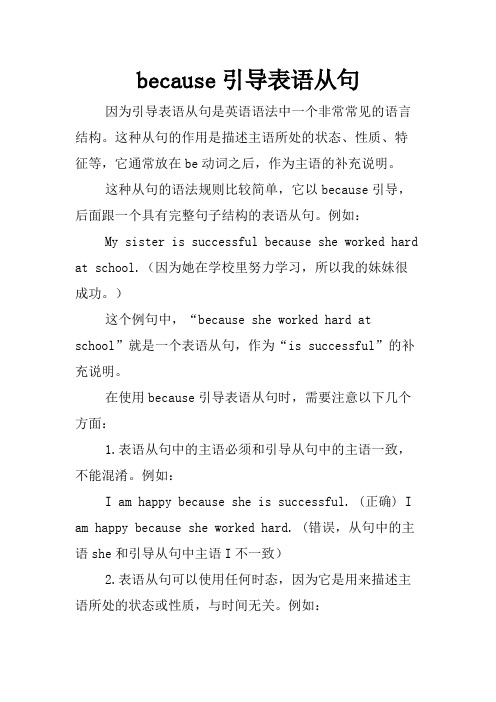
because引导表语从句因为引导表语从句是英语语法中一个非常常见的语言结构。
这种从句的作用是描述主语所处的状态、性质、特征等,它通常放在be动词之后,作为主语的补充说明。
这种从句的语法规则比较简单,它以because引导,后面跟一个具有完整句子结构的表语从句。
例如:My sister is successful because she worked hard at school.(因为她在学校里努力学习,所以我的妹妹很成功。
)这个例句中,“because she worked hard at school”就是一个表语从句,作为“is successful”的补充说明。
在使用because引导表语从句时,需要注意以下几个方面:1.表语从句中的主语必须和引导从句中的主语一致,不能混淆。
例如:I am happy because she is successful. (正确) I am happy because she worked hard. (错误,从句中的主语she和引导从句中主语I不一致)2.表语从句可以使用任何时态,因为它是用来描述主语所处的状态或性质,与时间无关。
例如:He was happy because he had passed the exam.(他很高兴,因为他通过了考试。
) She is confident because she has prepared well.(她很自信,因为她准备得很充分。
)3.引导从句中的动词必须是一个完整的句子,不能省略主语或谓语。
例如:He is tired because working hard all day. (错误,缺少主语) She is disappointed because he didn’t come. (正确)4.因为引导表语从句可以在一个句子中表示主从关系,所以它非常适合用于描述原因和结果之间的联系。
例如:Because the weather was so bad, we decided to stay indoors.(因为天气太糟糕了,我们决定待在室内。
初三英语中考语法考点重难点解读指导(二十九)Because肯定句和否定句用法含义辨析
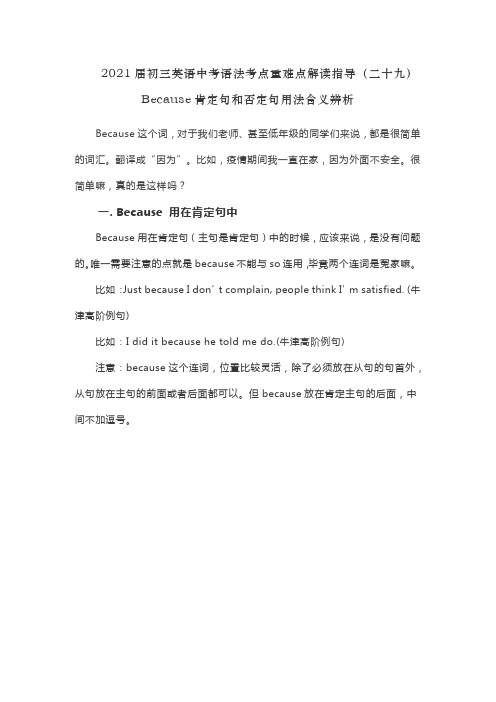
2021届初三英语中考语法考点重难点解读指导(二十九)Because肯定句和否定句用法含义辨析Because这个词,对于我们老师、甚至低年级的同学们来说,都是很简单的词汇。
翻译成“因为”。
比如,疫情期间我一直在家,因为外面不安全。
很简单嘛,真的是这样吗?一. Because 用在肯定句中Because用在肯定句(主句是肯定句)中的时候,应该来说,是没有问题的。
唯一需要注意的点就是because不能与so连用,毕竟两个连词是冤家嘛。
比如:Just because I don’t complain, people think I’m satisfied. (牛津高阶例句)比如:I did it because he told me do.(牛津高阶例句)注意:because这个连词,位置比较灵活,除了必须放在从句的句首外,从句放在主句的前面或者后面都可以。
但because放在肯定主句的后面,中间不加逗号。
很好,大家在这一部分,是没有问题的,也是不应该有问题的。
Because of是短语,后加名词或短语,不能加句子比如:They are here because of us. (牛津高阶例句)比如:Because of his wife being there, I said nothing about it.(牛津高阶例句)Because 和because of 的区别是初中的重点,这里不做多说。
二.Because(of)遇见not请问1①“I wouldn’t recommend chicken pox parties because of the risk.”和②“I wouldn’t recommend chicken pox parties, because of the risk.”这两句一样吗?请问2①“They don’t want to diagnose or treat Lyme disease because it is very costly to do so.”和②“They don’t want to diagnose or treat Lyme disease, because it is very costly to do so.”这两句一样吗?看了半天,大家有可能还没看到这组句子中的①句和②句到底有啥区别吧?当年苦练过大家一起来找茬的朋友,一定凭借着卓越的眼力发现了不同。
because与becauseof的用法比较_用法辨析英语语法.doc
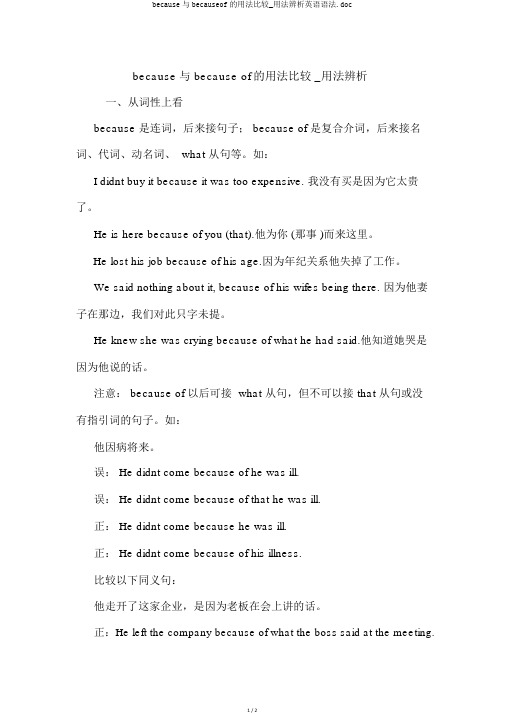
because与 because of的用法比较 _用法辨析一、从词性上看because 是连词,后来接句子; because of 是复合介词,后来接名词、代词、动名词、 what 从句等。
如:I didnt buy it because it was too expensive. 我没有买是因为它太贵了。
He is here because of you (that).他为你 (那事 )而来这里。
He lost his job because of his age.因为年纪关系他失掉了工作。
We said nothing about it, because of his wifes being there. 因为他妻子在那边,我们对此只字未提。
He knew she was crying because of what he had said.他知道她哭是因为他说的话。
注意: because of 以后可接what 从句,但不可以接 that 从句或没有指引词的句子。
如:他因病将来。
误: He didnt come because of he was ill.误: He didnt come because of that he was ill.正: He didnt come because he was ill.正: He didnt come because of his illness.比较以下同义句:他走开了这家企业,是因为老板在会上讲的话。
正:He left the company because of what the boss said at the meeting.正: He left the company because of the thing that the boss said at the meeting.我不可以因为有个家就停止斗争。
正: I cant stop fighting because I have a family.正: I cant stop fighting because of having a family.二、从用法上看because 所指引的从句除用作原由状语外,还可用作表语。
【英语】英语语法之:?原因状语从句
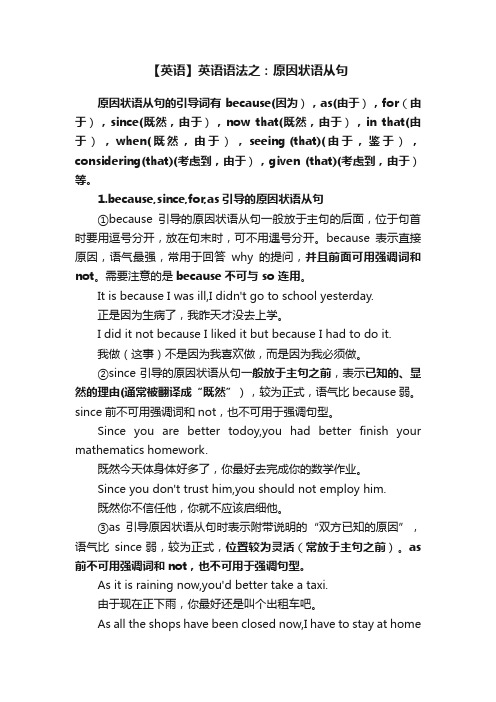
【英语】英语语法之:原因状语从句原因状语从句的引导词有because(因为),as(由于),for(由于),since(既然,由于),now that(既然,由于),in that(由于),when(既然,由于),seeing (that)(由于,鉴于),considering(that)(考虑到,由于),given (that)(考虑到,由于)等。
1.because,since,for,as引导的原因状语从句①because引导的原因状语从句一般放于主句的后面,位于句首时要用逗号分开,放在句末时,可不用遇号分开。
because表示直接原因,语气最强,常用于回答why的提问,并且前面可用强调词和not。
需要注意的是because不可与 so 连用。
It is because I was ill,I didn't go to school yesterday.正是因为生病了,我昨天才没去上学。
I did it not because I liked it but because I had to do it.我做(这事)不是因为我喜欢做,而是因为我必须做。
②since引导的原因状语从句一般放于主句之前,表示已知的、显然的理由(通常被翻译成“既然”),较为正式,语气比because 弱。
since前不可用强调词和not,也不可用于强调句型。
Since you are better todoy,you had better finish your mathematics homework.既然今天体身体好多了,你最好去完成你的数学作业。
Since you don't trust him,you should not employ him.既然你不信任他,你就不应该启细他。
③as引导原因状语从句时表示附带说明的“双方已知的原因”,语气比since 弱,较为正式,位置较为灵活(常放于主句之前)。
it is because 从句类型

it is because 从句类型在我们的日常英语写作和口语中,because从句是一种非常常见的一种方式来表达原因。
下面我们将详细介绍because从句的用法以及它在英语表达中的重要性。
首先,让我们了解一下because从句的基本结构。
因为它是一个引导词,所以它需要跟一个完整的句子。
这个句子可以是简单句,也可以是复合句。
例如:“I didn"t go to the party because I was feeling sick.”(我没有去派对因为我感觉不舒服。
)其次,because从句的用法非常灵活。
它可以放在句子的开头、中间或结尾。
当我们把because从句放在句首时,通常需要使用倒装语序。
例如:“Because it was raining, she took an umbrella.”(因为下雨,她带了把伞。
)此外,because从句还可以与其他原因状语从句连用,如although,since,because等。
这样可以增强句子的表达力。
例如:“Although he was tired, he continued to work because he knew the importance of completing the task.”(尽管他累了,但他还是继续工作,因为他知道完成任务的重要性。
)但是,我们需要注意的是,because从句并不是唯一表示原因的词。
therefore,since,because等词也可以引导原因状语从句。
因此,我们在写作和口语中要根据语境选择合适的词。
总的来说,because从句是英语中非常重要的一部分。
通过熟练掌握它的用法,我们可以更好地表达原因,使我们的句子更加丰富和生动。
- 1、下载文档前请自行甄别文档内容的完整性,平台不提供额外的编辑、内容补充、找答案等附加服务。
- 2、"仅部分预览"的文档,不可在线预览部分如存在完整性等问题,可反馈申请退款(可完整预览的文档不适用该条件!)。
- 3、如文档侵犯您的权益,请联系客服反馈,我们会尽快为您处理(人工客服工作时间:9:00-18:30)。
because的用法归纳_用法辨析
1. because 表示的是必然的因果关系,语气最强,通常放在主句之后,若需强调则放在主句之前
2. 通常用来回答why提出的问题。
如:
A:Why can’t you do it now?你为什么不现在就做呢?
B:Because I’m too busy. 因为我太忙。
3. 可引导从句作表语。
如:
It is because he is foolish. 那是因为他太蠢了。
4. 可用于强调句。
如:
It is because he is honest that we likehim. 是因为他诚实我们才喜欢他。
5. notbecause这一结构中的not 有时否定主句,有时否定从句,一般要根据句子的意思作出正确或合乎逻辑的理解。
若not否定主句,最好在because之前用逗号,否则会引起歧义,如下句在没有特定上下文时就有两种解释。
如:
I didn’t go because I was afraid.
(1) 我没有去是因为怕。
(2) 我不是因为怕才去。
不过若because之前有just修饰,一般认为not 是否定从句而不是主句。
如:
You shouldn’t get angry just because some people speakill of you. 你不要因为有人说你坏话而生气。
He was not readyto believe something just because Aristotle said so. 他并不只是因为亚里士多德说过如何如何,就轻易相信它。
6. 表示的原因是因为这一意义时,一般要用下面这样的句型。
如:
The reason why he can’t come is that he is tired. 他不能来是因为他累了。
在这一结构中尽管不少人认为可将that改用because, 但也有不少人反对这一用法,学生宜慎用。
7. 汉语习惯上说因为所以,但在英语里却不能将so与because 连用。
如:
因为下雨,所以我们呆在家里。
正:Because it was raining, we stayed at home.
正:It was raining, so we stayed at home.
误:Because it was raining, so we stayed at home.
8. 用于because of, 意为因为,用法注意:
(1) 是复合介词,其后可接名词、代词、动名词以及由关系代词型的what 所引导的从句等。
如:
He couldn’t come because of illness. 他因病不能来。
I said nothing about it, because of his wife’sbeing there. 因为他妻子在那儿,我对此事只字未提。
He knew shewas crying because of what he had said. 他知道她哭是因为他说的话。
注意:
because of不能直接引导从句或后接that引导的从句。
如:
他不能来是因为他病了。
正:He can’t come because he is ill.
正:He can’t come because of his illnes s.
误:He can’t come because of he is ill.
误:He can’t come because of that he is ill.
(2) because of 一般引导状语,不引导表语(引导表语时可用dueto)。
如:
正:His absence is due to the rain. 他因雨未来。
误:His absence is because of the rain.
但是若主语是代词(不是名词),because of 引出的短语则可用作表语。
如:
It is just because of money. 那只是因为钱的原因。
9. 关于because, since, as, for 的用法区别
(1) . because 可用来回答why提出的问题;可以引导表语从句;可用于强调句等,而其余三者则不行。
(2) because 表示的是必然的因果关系,语气最强,通常放在主句之后,若需强调则放在主句之前;since, as所表示的原因是人们已知的,是对已知事实提供理由,而不表示直接原因。
它们引导的从句通常放在主句之前,有时也放在主句之后。
如:
As he wasn’t ready in time, wewent without him. 因他未及时准备好,我们没等他就先走了。
Since we have no money, it’s no good thinking about a holiday. 既然我们没有钱,考虑度假有什么用。
至于for, 它是并列连词(其余三者为从属连词),它有时可表示因果关系(通常要放在主句之后,且可与because 换用);有时不表示因果关系,而是对前面分句内容的解释或推断(也要放在主句之后,但不能与because 换用)。
试比较。
①The ground is wet, for (=because) it rained last night. 地面是湿的,因为昨晚下过雨。
②It must have rained last night, for the ground is wetthis morning. 昨晚一定下过雨,你看今天早上地面是湿的。
